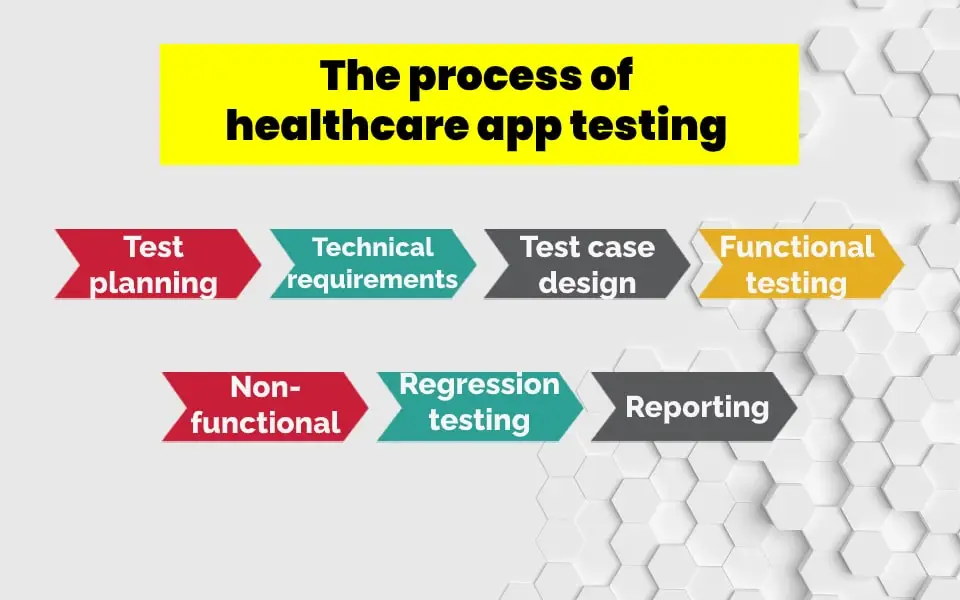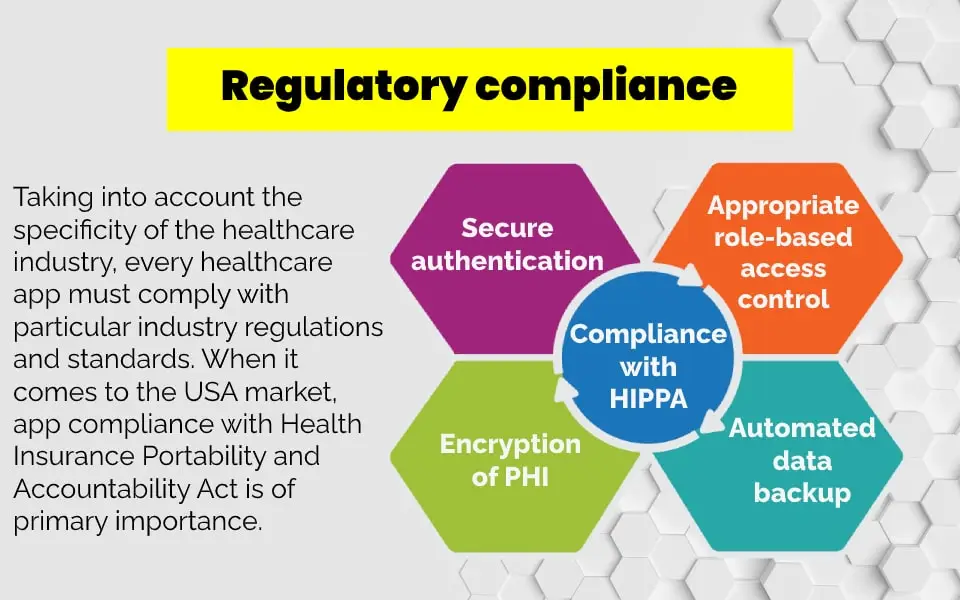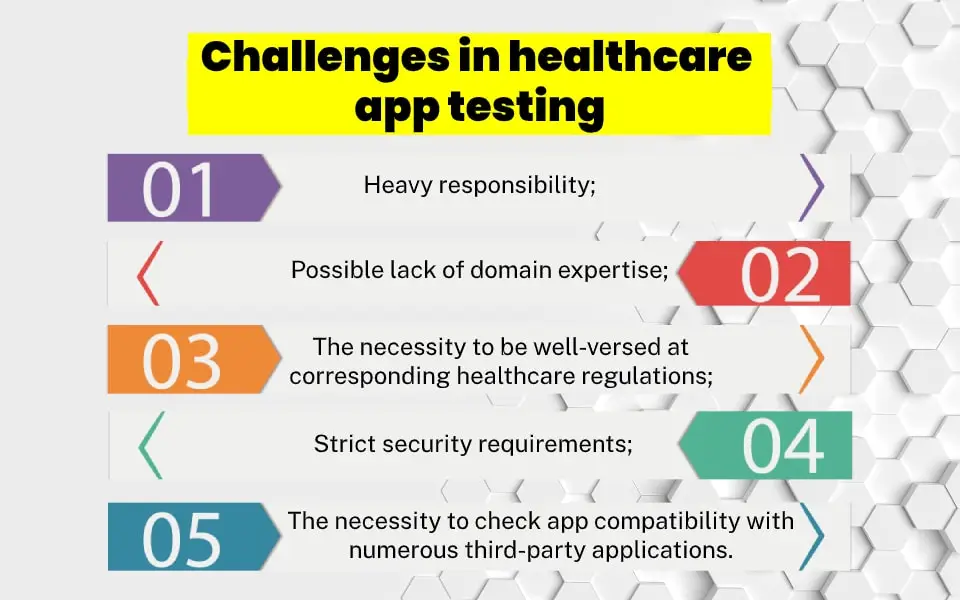A healthcare application is a rather specific product that requires a particular approach to testing. Many aspects must be considered and the most various types of software testing must be executed to hit the market with a first-class application that would be highly appreciated by either healthcare service providers or their clients. To achieve great results in healthcare app testing, it is essential to have great experience in quality insurance and rich domain expertise. If you are one of those who make just the first steps in this direction, our article can come in handy and provide you with useful tips and tricks.
The process of healthcare application testing

To ensure a high quality of healthcare application and prevent being behind schedule and over budget, it is important to stick to an effective testing procedure allowing to optimize resources and QA processes and provide excellent results. So a healthcare application testing process should be like this:
Test planning
An effective software testing requires preliminary well-thought-out planning. During this stage, a QA team gets acquainted with product requirements and determines a project scope in order to draw up a test plan that is a detailed document including a test strategy, goals, required resources, schedule, deliverables, etc.
Precise planning gives an opportunity to estimate testing costs and duration, measure required resources, and outline possible risks and challenges.
Testing of technical requirements
This stage is of high importance, as requirements can also contain ambiguities that will cause serious bugs in the developed app. That is why QA experts have to thoroughly study requirements and check them for completeness, unambiguity, feasibility, and consistency. This approach helps make sure that project requirements comply with quality criteria and business objectives.
Test case design
As soon as requirements have been studied and the test plan has been developed and confirmed, it is high time to proceed to the test case design.
Functional testing
Actual testing always starts with functional testing. So at this stage QA team checks whether app functionality works as expected and feeds developers with information as for detected bugs.
Non-functional
After functional testing, if the application is stable and does not contain critical functional bugs, QA engineers get to non-functional testing that covers such aspects as app performance, scalability, reliability, usability, security, etc.
Regression testing
When developers report bug fixing, it is important not only to make sure that bugs have been indeed eliminated but check whether other functionalities have not been affected by the code modifications conducted during bug fixing. Regression testing assists with this task ensuring that the app works smoothly.
Reporting
It is important to generate a report after each testing iteration to provide information on all performed testing activities and test outcomes. Testing reports help to understand whether the healthcare app is ready to be delivered to the market.
What to check in the course of healthcare app testing
Healthcare apps are rather vulnerable. They must undergo consistent testing to exclude all possible bugs and inconveniences that can cost a human life. To provide a high quality of the app, a vast number of aspects need to be thoroughly checked. We would like to draw your attention to some of them.
Data security
Usually, healthcare apps contain a great amount of personal information. As a result, they are often subjected to hacker attacks. Recent research has revealed that more than 20% of the data breaches in the USA are made within the healthcare niche. To effectively defeat possible cyberattacks and prevent data leakage, it is important to ensure data security and reveal all vulnerabilities and soft spots in the app during security testing.
Data privacy
No one would like to have his or her medical data being seen by someone else except corresponding medical staff. The task of QA engineers to make sure that an app has secure authorization and strict access control, i.e. each app user should have access to particular data in accordance with his or her role.
Taking into account the specificity of the healthcare industry, every healthcare app must comply with particular industry regulations and standards. When it comes to the USA market, app compliance with Health Insurance Portability and Accountability Act (HIPAA) is of primary importance. This act actually regulates data security.
Its main requirements are:
Compliance with HIPAA not only provides app security but helps avoid penalties that can be imposed for violation of HIPAA rules.

Usability
Usability is undoubtedly important for apps of any type. Still, when it comes to healthcare apps, they should provide a great user experience and UI. Today, people, especially doctors, are extremely busy and cannot afford to spend a ton of time trying to figure out how an app works.
Performance
Performance characteristics of a healthcare app have a great impact on the users' satisfaction. The task of a QA team is to check whether an app works smoothly and provides quick responses in even the most extreme conditions
Compatibility
As a rule, healthcare apps are not used independently, most of them integrate with third-party medical systems which makes them more convenient and helpful, So it is important to check whether a healthcare app is compatible with the required and most widely-used healthcare systems and devices.
Testing types crucial for healthcare applications
Comprehensive testing is a formula for success when you deal with healthcare applications. The thing is that not only the commercial success of an app but people's lives are at stake. Therefore, to ensure that a healthcare app does not contain bugs that can cost a human life, QA experts have to execute all possible types of software testing. Let's have a look at some of them:
Functional testing
It is pretty obvious that we cannot test any software properly without functional testing. Moreover, there is no sense to embark on other types of testing if functional testing has not been conducted. We are sure that you are pretty aware of what stands behind functional testing, still, we cannot help but remind you that it is a type of software testing conducted to check whether every software feature works as expected, i.e. in accordance with functional requirements.
Performance testing
In emergency situations every second counts. That is why it is crucial to make sure that a healthcare app does not fail to provide necessary information or process transactions in a blink of an eye. Performance testing, in its turn, is conducted to check app response time, speed, stability, and scalability, under certain workloads. Particular attention should be paid to such types of performance testing as:
Load testing
It checks whether an app is able to work properly under the estimated user loads.
Stress testing
This testing checks app performance under extreme workloads. In such a way, stress testing gives an opportunity to reveal the breaking points of an app.
Endurance testing
It is executed to ensure that an app can handle the estimated load for a long stretch of time.
Volume testing
It monitors the behavior of an app while data volume in the database is being increased. This type of performance testing is essential as healthcare apps usually collect and store a vast amount of medical data.
Compatibility testing
Compatibility testing checks whether your healthcare application runs properly on different devices, OS, browsers, network environments, and with different third-party applications. As we have already mentioned compatibility is one of the most prominent characteristics of a good application.
Usability testing
Usability testing is conducted to check if an app is user-friendly and easy-to-use. A healthcare app must not only provide valuable features but be rather simple and intuitive. An app with excellent usability characteristics helps save a ton of time as there is no need to learn the way it works.
Compliance testing
Compliance testing checks whether a healthcare app meets corresponding regulatory requirements. The necessity to comply with the corresponding government healthcare regulations is one of the main peculiarities of healthcare applications. For example, HIPAA defines the requirements for data security in healthcare applications.
Security testing
Security testing is a must for healthcare applications. A QA team must make sure that the personal data of patients is securely protected, and cybercriminals do not have any chance to access and steal sensitive data.
Localization testing
Localization testing checks whether an app has been properly customized according to the linguistic and cultural aspects of particular countries. Localization testing is relevant if a healthcare application targets multiple markets all over the world. To avoid any ambiguities it is indeed essential to check UI, currency, date and time format, and pay particular attention to content translation.
Challenges in healthcare application testing

Testing of healthcare applications is really sophisticated and QA engineers often face numerous challenges. The most common among them are:
Conclusion
Healthcare application testing is far from being an easy task. Not every QA team can cope with it. Taking into account the complexity and specificity of healthcare applications, QA experts now and then face different challenges, related to the high responsibility and necessity to conduct a wide range of the most compound tests. That is why it is recommended to have in your QA team specialists with profound domain knowledge and rich experience in the most various types of software testing. Besides, it is crucial to have a tailored and well-orchestrated test plan that would help to manage testing processes effectively and exclude any possibility to miss key points of healthcare app testing. The special focus should be on security, compliance, compatibility, performance, and usability testing.


